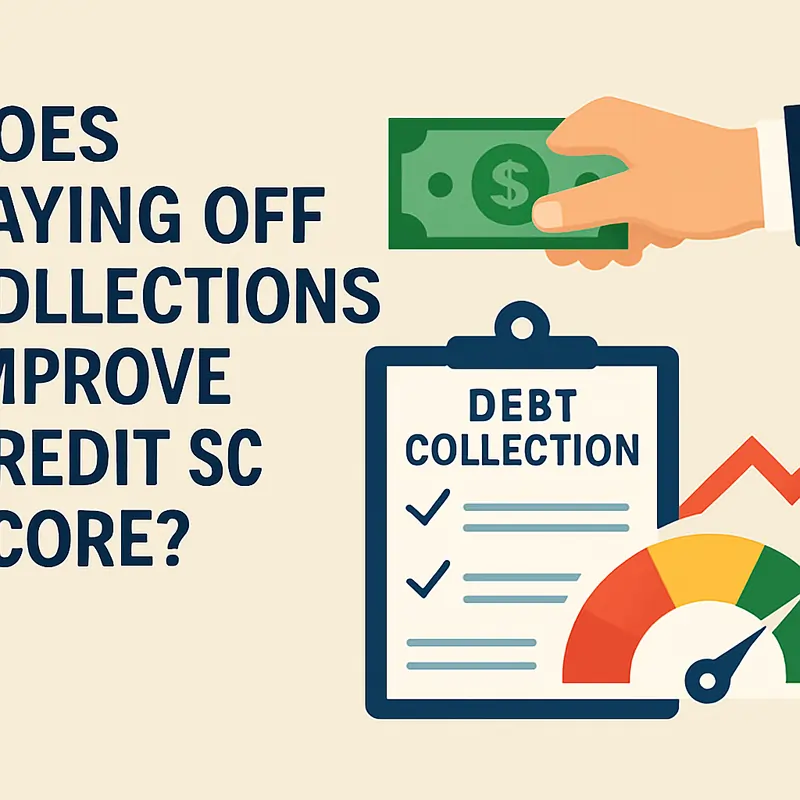Does Paying Off Collections Improve Credit Score? Here’s What You Need to Know
Your credit score is more than just a number. It determines your financial possibilities—what loans you qualify for, what interest rates you receive, and even what apartments or jobs you might get. So, when you see a collection account on your credit report, it’s natural to ask: Does paying off collections improve credit score? The answer isn’t as straightforward as many would hope. But understanding how collections impact your credit, and what happens when you pay them off, can help you make a strategic plan to rebuild your financial standing.
Understanding How Collections Affect Your Credit Score
Collection accounts appear on your credit report when you have a debt that goes unpaid for a significant period and the original creditor sells it to a collection agency. These accounts are among the most damaging items to your credit profile.
The presence of unpaid collections can lower your score by dozens or even hundreds of points depending on:
- The age of the collection
- The balance
- The number of collection accounts
- Your overall credit history
According to FICO, the most commonly used credit scoring model, payment history makes up 35% of your score. So, a collection can seriously derail your creditworthiness.
Will My Credit Score Go Up If I Pay Off Collections?
Yes and no.
Paying off a collection account does not automatically erase the account from your credit report. Instead, it updates the status to “Paid” or “Settled.”
However, newer versions of credit scoring models, such as FICO 9 and VantageScore 3.0, ignore paid collections when calculating your score. This means that if a lender uses one of these models, your score could improve significantly after you pay off the collection.
But here’s the catch: many lenders still rely on older models, like FICO 8, which do not ignore paid collections. In those cases, paying the debt might not provide an immediate boost to your credit score—but it still has long-term benefits.
Paid vs. Unpaid Collections: What’s the Difference?
Let’s break it down:
- Unpaid collections indicate that you still owe money, which reflects poorly on your credit behavior.
- Paid collections show that you’ve taken responsibility and fulfilled your obligation, which can be viewed more favorably by potential creditors.
Even if your score doesn’t jump overnight, paying collections reduces your debt-to-income ratio and signals reliability. That matters.
How Long After Paying Collections Does Credit Improve?
Most credit reports update within 30 to 45 days after a payment is made. If the scoring model being used excludes paid collections, you might see a change almost immediately after the update.
In practical terms:
- If your lender uses FICO 9, your score may improve once the account reflects as paid.
- If your lender uses FICO 8, the paid collection will remain a negative mark, but its impact may diminish over time.
Should I Pay Off Old Collections?
There is a strategy to this.
If a collection account is close to falling off your credit report (which typically happens after seven years), paying it might reset the clock and make it remain longer on your report.
However, if you’re looking to apply for a loan, mortgage, or even rent an apartment soon, having a “paid” status on your collection account may look better to underwriters or landlords.
Consult with a credit expert or lender before taking action.
Real-Life Example
Consider María, a Florida resident who wanted to purchase a car but had a $1,200 medical collection on her credit report. Her score hovered around 590. After paying off the collection and working with a credit counselor to remove another outdated item, her score rose to 640 within two months.
She qualified for an auto loan with a more favorable interest rate, saving her hundreds in monthly payments.
Expert Insights
“Paying off collections shows financial responsibility,” says Juan Rivera, a certified credit consultant at Inversiones y Finanzas Hispano. “While it may not always boost your score instantly, it’s an essential part of long-term credit repair and access to better financing options.”
Tips to Improve Credit Score After Collections
- Ask for Pay-for-Delete: Some collection agencies will agree to remove the account from your report if you pay. Get it in writing.
- Negotiate a Settlement: If you can’t pay in full, a settlement can still reflect better than unpaid debt.
- Monitor Your Credit: Use apps or annualcreditreport.com to track updates.
- Dispute Errors: Make sure the collection is accurate. If not, dispute it.
- Build Positive Credit History: Use secured credit cards, become an authorized user, or take out a credit-builder loan.
FAQs: Does Paying Off Collections Improve Credit Score?
Q: Does paying off collections improve credit score immediately?
A: Only if the scoring model excludes paid collections (e.g., FICO 9). Otherwise, the score may not change much initially.
Q: How long does it take for credit score to update after paying collections?
A: Typically 30 to 45 days after payment.
Q: Can paying off collections help me get approved for a loan?
A: Yes. Even if your score doesn’t rise much, lenders often favor applicants who have paid their debts.
Q: Will the collection account be removed after payment?
A: Not automatically. You can request removal through a “pay-for-delete” agreement.
Q: Should I pay a collection that is about to fall off?
A: It depends. If you’re not applying for credit soon, you may choose to let it fall off. If you’re applying soon, paying it may be the better option.
Final Thoughts: Rebuilding Credit is a Journey
So, does paying off collections improve credit score? In many cases, yes—but it depends on several factors. Even when the score doesn’t budge much at first, taking action to resolve debts can lead to better loan terms, more financial opportunities, and peace of mind.
At Inversiones y Finanzas Hispano, we specialize in helping individuals like you navigate the world of credit with confidence. Whether you’re working through collections or starting fresh, our expert advice and resources are here to guide you every step of the way.
Ready to rebuild your credit and open doors to financial freedom? Start today.

